This has been an unbelievable year of representation for lesbian, bisexual, queer, and trans women on television. Riese broke down GLAAD’s findings just a few weeks ago, but the bottom line is: there are more of us than ever before, on more kinds of shows than ever before, and there are more ways to watch us than ever before, and there are more queer people of color to watch than ever before. In fact, as Riese pointed out, “for the first time ever, LGBTQ characters of color (50%) outpace white (49%) characters! Just barely but still!” All of those things are evident in our TV Team’s annual list of our favorite and least favorite characters. There were so many really good LGBTQ characters on TV in 2018 that there were only a small handful of shows that we all watched (Jane the Virgin, Pose, One Day at a Time, The Bold Type, and Black Lightning.) For the first time ever on this list, you can actually see the personalities of our writers shining through in the things they chose to watch and how they chose to write about them because we weren’t all forced to watch and argue about visibility on the same six shows. Below are our choices; we’d love to hear yours!
None of these write-ups are the Official Position of Autostraddle on any of these shows or characters; they are the individual opinions of our TV writers.
FAVORITE
Riese, Editor-in-Chief
Nancy Birch, Harlots
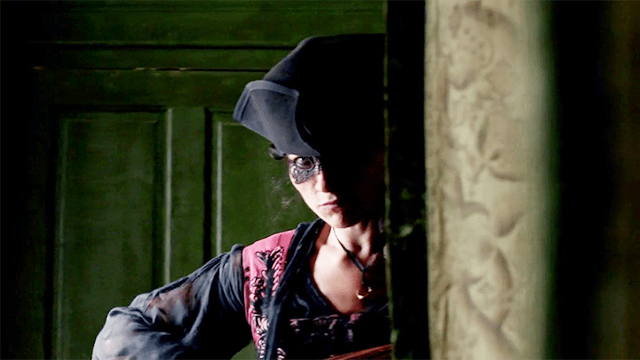
Nancy Birch pinged from the jump, but in Harlots’ second season, she finally rang the bell and said out loud that she was queer, and specifically that she was in love with Margaret Wells. Maybe she always had been. Nancy — a dominatrix who’d do anything for the women she loves — sort of dresses like a low-rent pirate, and always looks vaguely hungover or that she did her makeup and then slept on it. She’s like an old-fashioned hyper-aggressive Mommi, you know? I want her to like, punish me.
Villanelle, Killing Eve
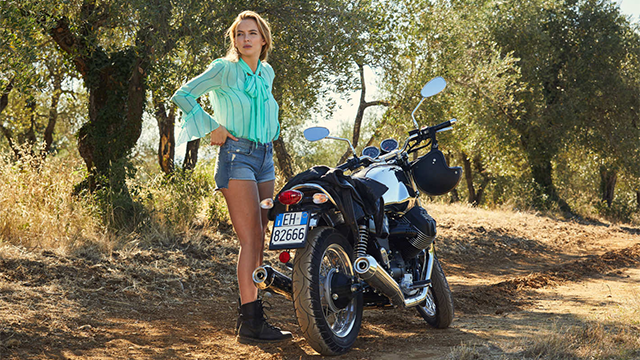
Wow, why are all of my favorite characters this year basically women I want to have aggressive sex with? I’m not sure. Anyway, Villanelle is a psychopath serial killer. You know the scene where she’s eating chicken pot pie leftovers out of the container and she’s got that long winter underwear shirt on and the shirt is on top of another shirt and her elbows are on the table and she’s eating like a medieval man? Wow, right? Anyhow, Villanelle is everything we don’t want lesbian characters to be (besides dead) (and yes, I know that some people read her as bisexual and I think that’s valid and perhaps even correct, I just read her differently and I think that’s okay don’t @ me) and yet she is so fucking weird that she won my heart. I can’t wait for season two of this very bizarre show.
Leila, The Bisexual
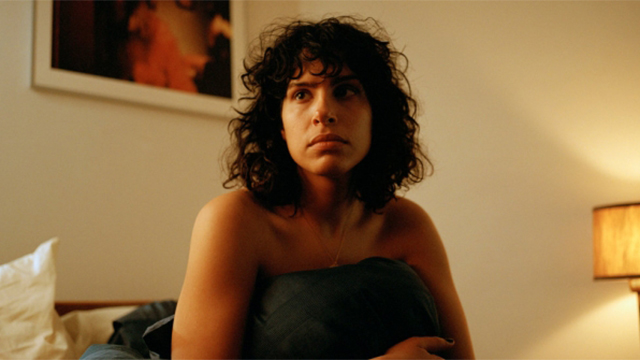
Ah yes, and here we have yet another slightly unstable, sexually creative, broad-shouldered woman. This show was wholly original and brutally honest and felt really fucking real. A lot of shows were like that this year — tangibly authentic because they were written by people who understood deeply the stories they were telling. Akhvan has been called “the bisexual Lena Dunham” and although it’s safe to say Lena Dunham usually sucks (although I should admit AGAIN DON’T @ ME that I did enjoy the HBO series Girls), I get the concept behind it — Leila is a little destructive and sloppy, looking for love in all the wrong places, often shooting herself in the foot. At the same time [unlike any of the girls on Girls], she is somebody I feel deep affection for. I understand why she’s doing what she’s doing, and listen, I support her journey. Plus, she is very tall and hot.
Valerie Anne, Staff Writer
Waverly Earp, Wynonna Earp
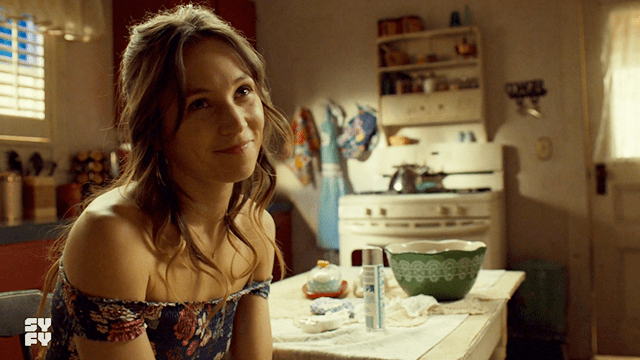
Waverly Earp continues to be such a lovely, bright spot on TV for me this year. Nicole was a strong contender for this favorite list, being a loving girlfriend, a badass sheriff and a loyal friend to the Earp girls, but the Jolene episode really cemented Waverly as the one who owns my whole soul. I’ve always identified with Waverly in some ways, and aspired to be more like her in others, so I’m obviously biased, but I think she had a really strong season. She traveled the journey of having and almost losing hope, and learning things about yourself, some that hurt and some that make you stronger. And I mean she was revealed to be a LITERAL angel. A literal queer angel born of a creature from actual heaven. She’s the light I really needed in this dark, dark year.
Sara Lance, Legends of Tomorrow
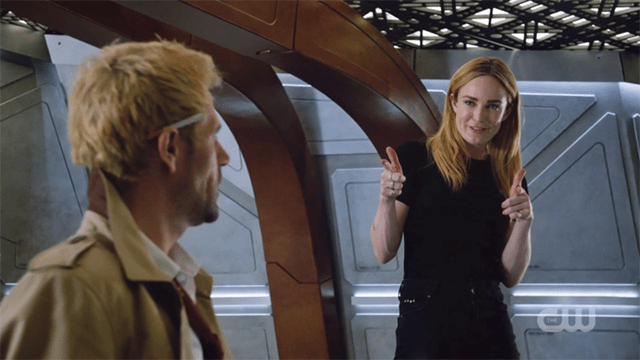
Sara Lance, and Legends as a whole, delights and surprises me week after week. It just keeps getting stronger and funnier and weirder in the best ways. And seeing Sara in a semi-domestic relationship with Ava, giving other people the same advice she needed two years ago – it’s been truly a wonder to behold. The show just keeps leaning into the queerness (in all senses of the word) and I think they’re better for it. I mean they have a blonde, bisexual, badass babe as the undisputed Captain of this band of time-traveling weirdos and even when they travel to times that hesitate to accept her, her team never falters.
Theo Crain, Haunting of Hill House
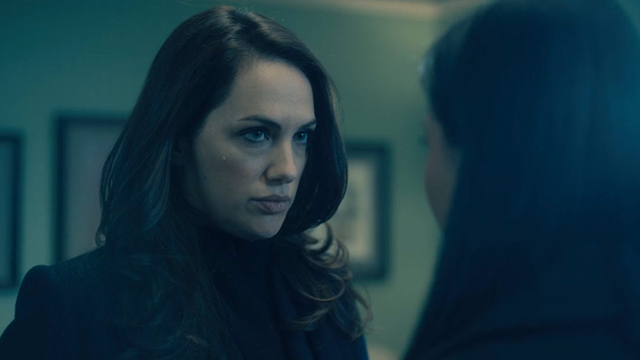
I went into Haunting of Hill House looking for spooks and maybe some feels and it delivered on both tenfold. It had all the makings of the best horror movie you’ve ever seen, but then added a layer of character development that’s otherwise hard to accomplish in only 90 minutes. I have a special place in my heart for all the Crain siblings (except Steven… fuck Steven,) but Theo Crain wrapped her be-gloved hand around my heart and hasn’t let go since. As someone who considers herself an empath in the least supernatural sense of the word, Theo’s journey really spoke to me, and it didn’t hurt that she was also queer. Plus, (spoiler alert) despite being a queer woman in a horror scenario, she survives! It’s a miracle.
Mel Vera, Charmed
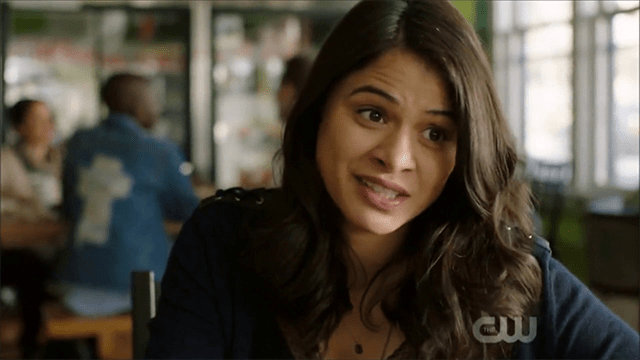
The new Charmed is, well, charming me way more than I expected. I went in hesitant because I loved the original, but hopeful because I loved the actresses cast as the new sisters. The show has proven to be so much fun, with a pointed and hopeful tone reminiscent of season one of Supergirl. I love Mel because she’s out and proud and smart and bold and not afraid to speak her mind. Well, unless she’s talking to Niko, but that’s just because she loves her a lot and can’t tell her she’s a witch! You know, normal girlfriend stuff. Anyway, I love her a lot. This season took a surprising turn for Mel and Niko’s relationship, but so far the show has given me faith that they aren’t about to sweep Mel’s queerness under the rug anytime soon.
Karolina Dean, Marvel’s Runaways
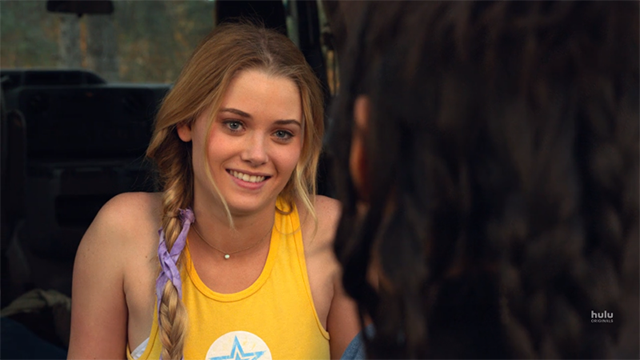
Honestly I can’t tell you what it is about Karolina Dean that I love so much. There’s something about her story, her loyalty to her friends, her disillusionment in her parents, her discovering the power within her –and discovering she likes kissing girls (well, one girl in particular) — I love it all. Karolina and Nico’s first kiss and the way she smiled after, like she finally let out a breath she didn’t realize she was holding, it was so perfect. And their second, too! As much as I love me some angst, the EASE with which Karolina came out to herself was so inspiring and I think important for people to see; you’re not any less queer for not having struggled with it, you know? Anyway, I love this sunshiny rainbow and her goth girlfriend so much and can’t wait to see what they get up to in the new season.
Natalie, Staff Writer
Annalisa “Quiet Ann” Zayas, Claws
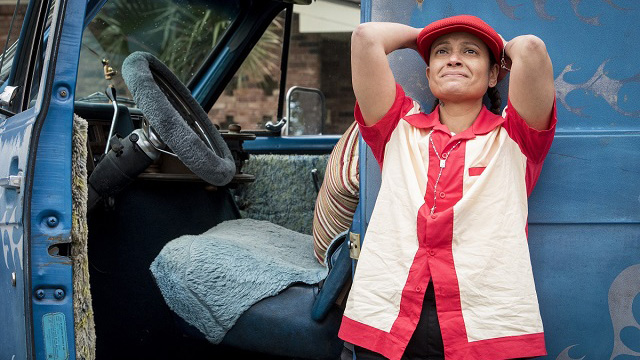
There’s a scene in “Scream,” the Ann-centric episode in Claws‘ second season, where Desna’s trying to figure out whether to side with the Russians or Uncle Daddy and the Dixie Mafia in their ongoing feud. She turns to her crew for advice and, eventually, lands on Ann. The voiceover comes in, revealing Ann’s thought: “You’re gonna ask me about loyalty?”
That Ann’s angry at that moment isn’t a surprise to the audience — the day’s been filled with reminders of what she lost: her child, snatched from her arms at 17; her freedom, taken away when she’s sent to prison for stabbing her cheating girlfriend; her family, lost to her when she returned from prison, changed; the love of her life and her would-be family, sacrificed so that Desna could skate on a murder charge. Ann’s rage is not a surprise. What is surprising is that, rather than letting the silence lay thick or worrying about how she’s heard, as is her wont, Quiet Ann speaks for herself, “I think you got a lot of nerve asking me about loyalty.”
It’s a fundamental shift in how Claws has treated Quiet Ann for the prior 13 episodes. It also addresses one of the show’s fundamental flaws from the first season. At the time, I lamented that, despite offering us intriguing but brief glimpses into Quiet Ann, “each and every time there’s a possibility to make this show’s butch Latina into something other than a plot device, the writers go the other way.” Thankfully, with this scene, the show’s writers’ uncorked Quiet Ann. Her genie is not going back into its bottle ever again.
Blanca and Angel Evangelista, Pose
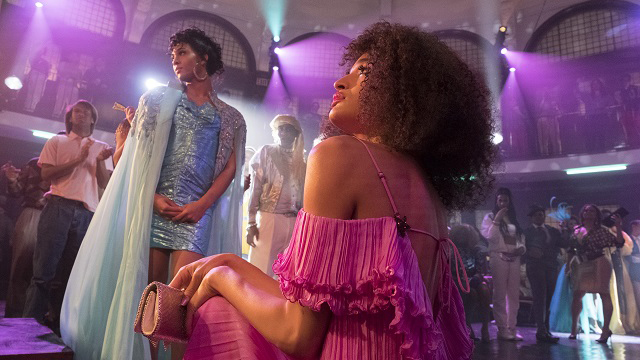
For the longest time, I didn’t see myself on television, but still, I had that impulse to find commonality between myself and the people that I welcomed into my home. I wouldn’t get to see all of me, but I’d always find something — Dwayne Wayne’s nerdiness, Brian Krakow’s unrequited love for Angela Chase, Pacey Witter’s “black sheep” status — to ensure that I could see some part of myself in stories that looked nothing like mine. As time passed, I started to see more characters on television that looked like me and loved like me and shared my experiences… and that representation, in a word, was amazing.
It is amazing. It’s amazing that we’ve reached a point where a person can wrap themselves in a cocoon of characters that affirm who they are on a regular basis. Is this how cis white dudes feel all the time?
This year, I’ve started to wonder — to worry, honestly — if we’ve grown too attached to the need to see ourselves on-screen. There’s value in representation, always, but there’s also value in seeing and investing in the stories that aren’t your own, particularly those from other marginalized communities. It’s how we build empathy. Are we choosing to be seen over seeing others? And, if so, what implications does that have for our community?
I stepped into the world of the 1980s New York ballroom scene over the summer, not because I saw myself in the characters immediately, but because even if I didn’t, their stories were ones worth hearing. Cis folks hear trans people’s voices most often in protest: of bathroom bills, of military service bans, of cis folks’ collective silence in the face of their community’s deaths. There’s more to the trans community than that. Pose gives trans women space to be sing, act, dance, direct and write. The show is worth watching for that reason alone.
But when you dig into Pose, you find yourself investing in these characters because, whatever our differences, we share a common humanity. I saw myself in Blanca Evangelista (played exquisitely by Mj Rodriguez), the matriarch of her chosen family. A woman who, instead of being content to inherit something, someday, took a step out on a ledge, and built something of her own. She is a woman who wants to leave a legacy, to leave some proof that she was here. She is a woman who, in the face of discrimination, keeps coming back over and over again, to move us a little closer to justice. She is a woman who cares for others and works tirelessly to secure their future. She is me, in every way that counts.
If Blanca is the person I am, Angel is the person I wish I were. There’s such a certainty to her – a certainty that I keep thinking she shouldn’t have yet, she’s so young – that I envy. Angel’s been through some stuff. As Stan says, sometimes it feels as if she’s been “disinvited from the rest of the world.” Still, she’s a believer in the possibility of it all. I long for her sense of belief and, as the season progresses, find myself drawn to Angel. That’s in part because Indya Moore is magnetic, but also because I’m desperate to protect that spirit in her. A spirit I want so desperately to see in myself.
Carmen, Associate Editor
Eddy Martínez and Emma Hernandez, Vida
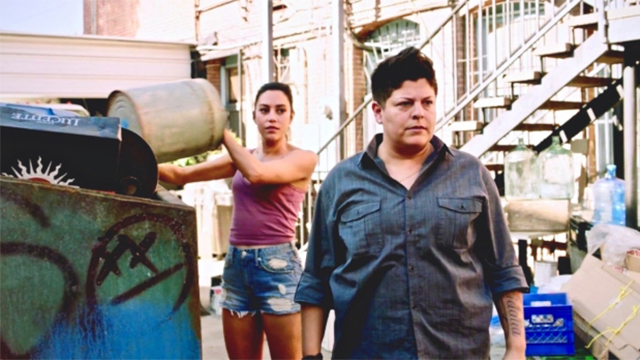
I thought about separating Vida protagonist Emma Hernandez from her stepmother Eddy for the purpose of this list. Certainly, the commanding performances by Mishel Prada and Ser Anzoategui each deserve their own recognition.
Prada’s Emma is tightly wound and multi-layered, an iceberg whose mass is 90% beneath the surface of its tip. It’s brave to deliver such a careful performance for a character that, quite honestly, it takes a couple of episodes to even like. That’s perhaps what is most wonderful about Emma; her love is hard won. But once you’ve opened yourself to her, there’s no turning back. She’ll consume your thoughts. I know she has consumed mine.
As Eddy, Anzoategui took the complete opposite approach. They opened their emotions wide and gaping right from the first moment we meet. Eddy’s eyes are mournful and haunting, her heart feels so visceral that you can almost see it beating on the table. She’s desperate to find any way forward after the death of her wife, she’s desperate to build a relationship with the daughters she’s left behind. Anzoategui never loses themself to Eddy’s rawness, instead choosing to shade the widow’s emotions with nuance. There’s a silent bathtub scene in Vida’s third episode that I still haven’t put down nearly six months later. It’s a testament to Anzoategui’s work.
Still, the most gripping performance I saw between a pair of actors this year was the dance created between Prada and Anzoategui together. They found honesty, even when its ugly, between their characters. They found love between all the rubble and broken hardness. For that, I’m pairing them together. (The fact that Prada also had this year’s hottest sex scene certainly doesn’t hurt.)
Blanca Evangelista, Pose
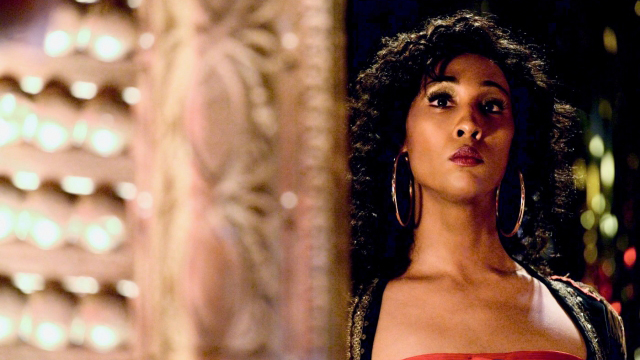
I’ve tried writing about Pose at least four times, and each time it’s ended up in the scrap pile because, really, what is there to say? Its goodness has surpassed words. Yes, watching Pose is important and culturally significant because it boasts the largest cast of trans women of color in television history. I do not want to shortchange that fact. I also wouldn’t want the historical weight of this moment to overshadow the fact that Pose is just damn good, supremely crafted television. It’s not a stretch to say that you’ll see it on a lot of critic’s year end lists, and not just the gay ones. This show is a powerhouse; it’s a force to be reckoned with.
Natalie is absolutely right: it’s important to watch television that doesn’t necessarily reflect you. I’d go as far as to argue that as a queer community, it’s our responsibility to lift up those voices of our siblings who aren’t being heard. We have to see our own humanity, because few others will grant us such grace. That said, the reason I love Blanca Evangelista (richly colored and portrayed by Mj Rodriguez) is because of how much she reminds me of myself. I wrote this summer, “Blanca Evangelista is the kind of character I’ve been waiting my whole life for. She’s an Afro-Latina, Puerto Rican, and fighting like hell to keep her queer chosen family together and make a name for herself in this world.” It’s still true. She’s the closet I’ve ever come to seeing all of me at once. And for that, she will always have my heart.
Annalisa “Quiet Ann” Zayas, Claws
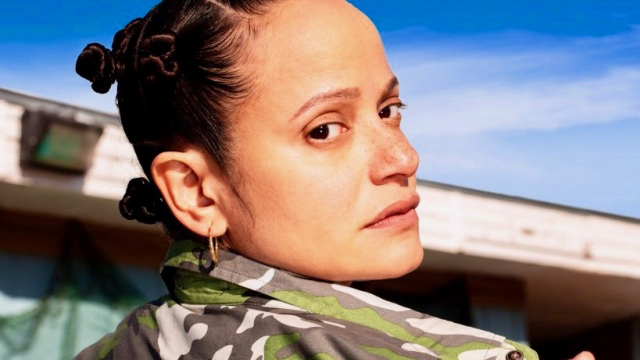
Judy Reyes proved this year that it’s not the size of the role, it’s what you do with it. I’m selecting Quiet Ann for this list based on the strength of one single episode.
“Scream” was an episode of queer women’s television unlike almost any other this year. It’s a stand out in a year full of stand outs. In fact, I’d argue that even when we take a long historical eye towards the queer women’s TV canon, this episode is still going to hold its own. In less than 45 minutes, Reyes took a someone who previously had not been much more than a silent comic relief and perfunctory side character, and found the depths of her soulfulness. It’s hard to do much with a character who rarely talks, a character for whom “quiet” is literally in her name. Yet, Reyes proved that Anne isn’t quiet because she’s an afterthought. She’s quiet because she’s interior to herself. She’s thoughtful and considerate. She’s full of pain and remorse, but also stubborn hopefulness in the face of hopeless surroundings. It’s hard to bring such meditative introspection to a television dramedy that’s made a name for itself in over the top parody, but the Scrubs alum is the exact right woman for the job. She threads the needle every time.
Anissa Pierce, Black Lightning
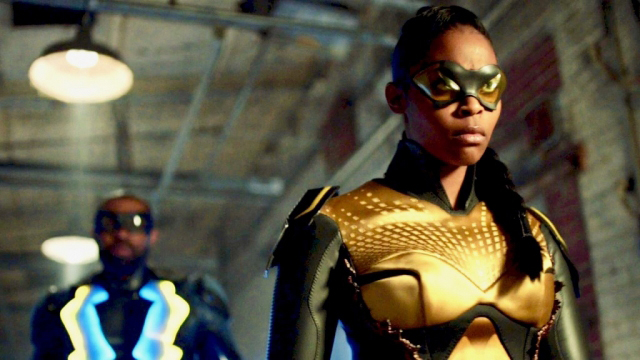
ANISSA. MOTHER F*CKING. PIERCE. If you didn’t think I was going to include our very own black lesbian superhero on this list, you were gravely mistaken. Before she even made her debut last January, Anissa’s bonafides spoke for themselves. She’s the first lesbian superhero on the CW. She’s the first black lesbian superhero ever. She’s a bullet-proof black lesbian on the very network that, until perhaps recently, was most famously tied to the killing of one of their lesbian characters with a gunshot. She’s a bullet-proof black lesbian in a country where black people are still fighting for the very respect of our lives as we continue to be shot down as victims of police and state violence. And that was all before the first episode aired.
What followed was even better. Anissa is brave; she’s tenacious (okay, and a little impetuous); she’s smart – like nerdy book smart, she’s in medical school smart; she loves her family and fights against systemic injustices in her community. She also has relatable flaws. She puts up walls and flits between romantic loves because the very idea of commitment startles her. Did I mention she’s been gifted with some of the best fight choreography this year? And that those fights happen almost exclusively against other women badasses? Nafessa Williams has delivered an easy-to-love performance this year, and I can’t wait to keep on loving her!
Catra, She-Ra and the Princesses of Power
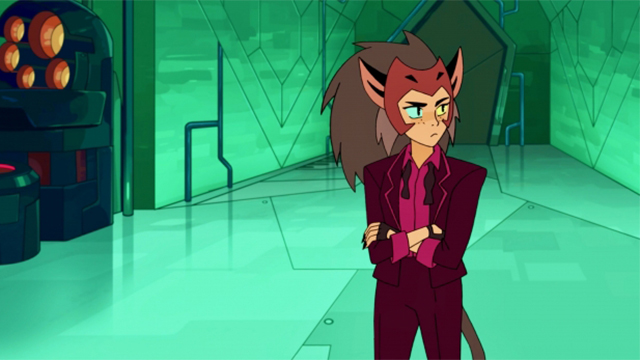
I recently came across a tweet on my timeline where a fan described Catra’s storyline as one of the best origins for an antihero this year. And sure, maybe that sounds hyperbolic, but I think that fan was on to something. It’s easy to care for Catra right from the beginning. She has a comeback for every putdown. She’s almost effortlessly cool with her torn up black jeans and perfectly spiked hair. She’s all edge and dark, warm colors in She-Ra’s otherwise pastel rainbow colored We’re Going To Win in the End! world. Most interestingly, Catra is dangerous. She’s legitimately threatening.
I intended for She-Ra to be pleasant background noise while I completed my Saturday morning chores, but Catra demanded all of my attention. What became clear was how much Catra hurt. She deeply felt the loss of her best friend. Her funny comebacks were thinly veiled covers for the old wounds she didn’t want you to see. She self-sabotaged herself at every turn, as if she was afraid to really try. By the time I arrived at the episode dealing with the emotional abuse that Catra and She-Ra dealt with in their childhood, I was in tears. I don’t remember the last time I cried at animation not made by Pixar! Here was Catra, filled up with a lifetime’s worth of pain and just trying to bottle it before it poured over everything.
It’s hard to make an animated villain that doesn’t feel, well, broad and cartoon-sh. Catra was completely three-dimensional. Also, did you catch her in that tux at Princess Prom? Can you swoon over a cartoon character? Because I think I just did.
Kayla Kumari Upadhyaya, Staff Writer
Sadie, The Bisexual
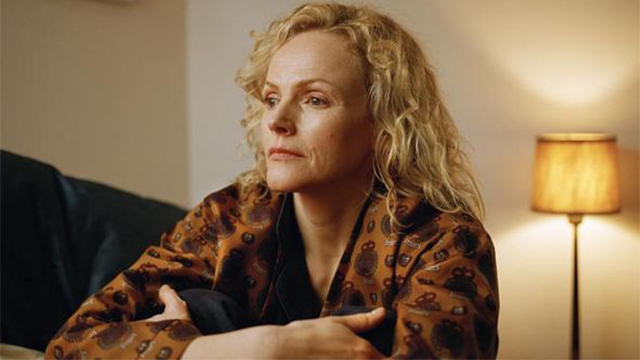
The second I set my eyes upon the gay art Mommi that is Sadie, I was smitten! Look, like all characters on The Bisexual, she has her flaws. She makes Leila’s own sexuality journey kind of about herself. And then she rebounds with her employee. But, would I gladly volunteer to co-parent the child she desperately wants to have? Fuck YES. Ruin me, Mommi!
Theo Crain, Haunting Of Hill House
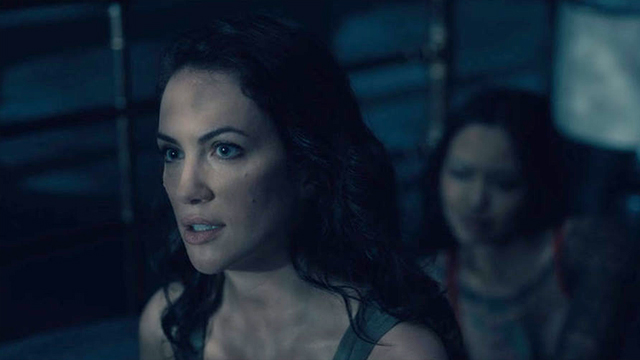
I really, really loved Haunting Of Hill House and aside from its technical stunner of a sixth episode, the best chapter is easily the one dedicated to its resident empathic lesbian Theodora Crain. Because of her, I firmly believe that gloves should be a lesbian fashion trend. Let’s just say that an emotionally withholding, somewhat messy lesbian who tries to fuck way her problems is… something I’m very drawn to.
Jane Ramos, Jane The Virgin
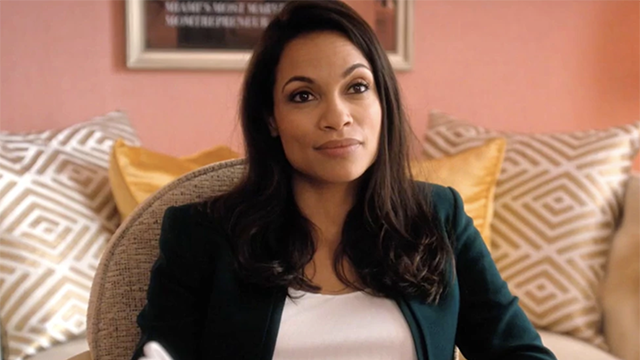
Am I listing my favorite television characters or the television characters I want to date? SAME THING! Jane Ramos’ intense confidence and the way she gradually melts over Petra Solano was easily one of my favorite parts of Jane The Virgin this year.
Arthie Premkumar, GLOW
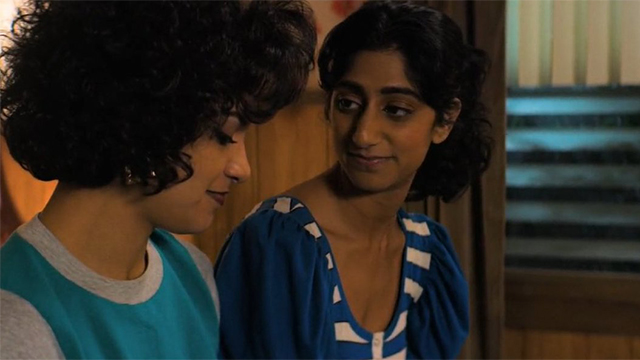
Okay, so we barely got a glimpse at Arthie’s sexuality questioning or the potentially blossoming romance between her and Yolanda last season of GLOW, but I’m so starved for queer South Asian representation that I gotta give her a shoutout. Hopefully next year on GLOW brings much more!
Emma Hernandez, Vida
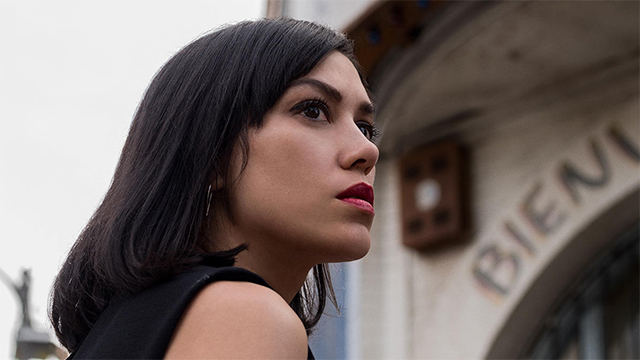
She’s hot; she’s complicated; she’s a control freak; she’s an emotional disaster. So Vida’s Emma hits all the right buttons when it comes to the television characters I enjoy watching. Crying while masturbating? A goddamn icon.
Heather Hogan, Managing Editor
Rosa Diaz, Brooklyn Nine-Nine
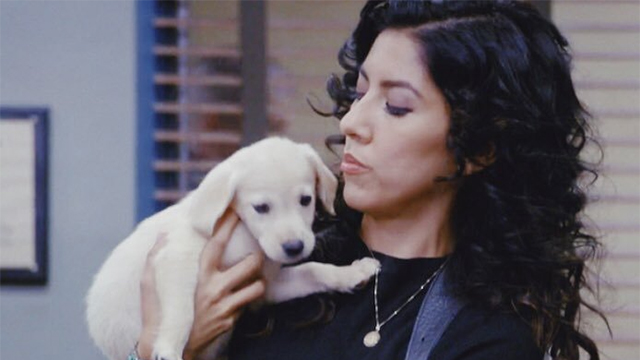
Brooklyn Nine-Nine has always been one of my favorite can’t-miss shows, but in 2018 I became a full-on evangelist for it, largely because of the way it handled Rosa’s coming out storyline. First of all, because noted bisexual Stephanize Beatriz was consulted by the writers on it; and second of all, because it was just so good. It’s very rare to see a character come out as bisexual and say the word “bisexual.” It’s even rarer when it’s an established character on a broadcast network show. What made Rosa’s story great was more than just the stats. It was just so Rosa. The sheepish, but gruff, way she told Boyle she was dating a woman. The time limit she gave the squad — exactly one minute and zero seconds — to ask questions. And then her heartbreaking, heartwarming, uncompromising coming out episode with her parents. It was so funny and so real and so Rosa.
Elena Alvarez, One Day at a Time
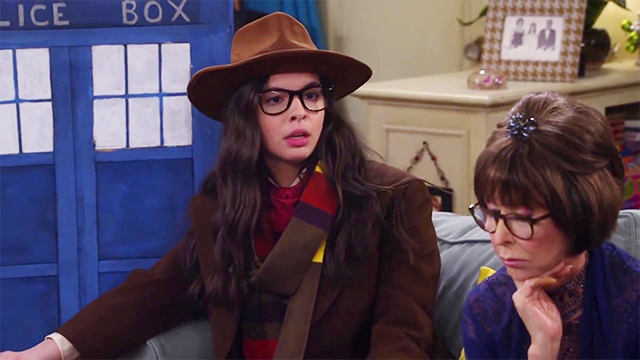
One Day at a Time has been on for two seasons and I’ve probably watched it more than any other comedy ever, besides The Golden Girls. (And, as you’ll see by comparing my list to everyone else’s, my heart beats for comedies.) Often times sitcoms stop with the revelation of a queer character’s sexuality — but ODAAT gave Elena a season two storyline that was as sweet and awkward as any first time queer romance I’ve ever seen on TV. I scooted closer to the TV when she was trying to figure out if Syd liked her, cheered when they had their first kiss, and swooned like a cartoon character when they went to their first dance together. Plus, Elena had lots to do outside of her relationship; she grew as an individual person, too, learning more about herself, her culture, her family, and even her gender presentation.
Leila, The Bisexual
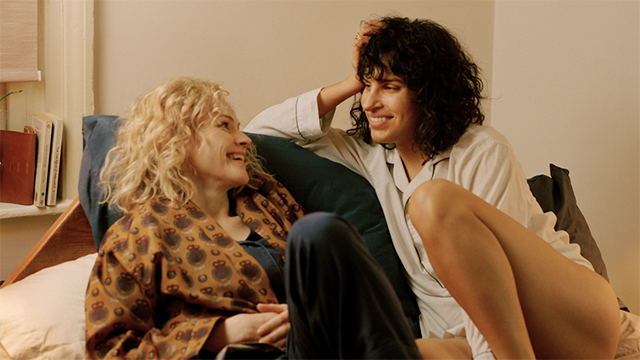
Because I am a human afflicted with humanity’s narcissism I am most drawn to TV characters whose bumbling, sweet nerdiness (see above) remind me of myself or whose sense of moral courage and heroism (see below) show me the me I want to be. What I am not drawn to is messy TV characters, especially messy queer women TV characters — but among the many revelations I had while watching Desiree Akhavan’s The Bisexual this year was that messy queer women TV characters are usually just sloppily written queer women TV characters. Akhavan’s Lelia is generous and selfish and hard and sharp and still full of wonder and boi is she messy! But that only made me love her more! She’s authentic in a way I’m not sure I’ve experienced from a mid-30s queer woman on television. And the way the show explores her bisexuality is definitely not something I’ve ever seen. It doesn’t indict anyone; it just asks a lot of questions and generously explores the answers.
She-Ra, She-Ra and the Princesses of Power
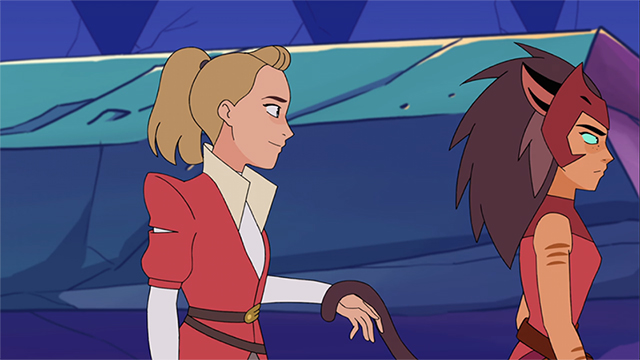
I was more excited about Netflix’s She-Ra reboot than anyone I know and was also more surprised than anyone when it exceeded every one of my expectations, including the fact that it’s maybe the queerest thing I have ever seen on TV in my life. Just so casually unapologetically queer. Adora, to me, is the perfect metaphor for growing up in an oppressive, oh let’s say, conservative white evangelical Christian community and lucking your way out of it to fight on the side of the good guys (who you’d been taught were the bad guys). She’s tough and smart and destined for greatness as she chooses goodness and also she just loves horses! (And Catra.)
June, Forever
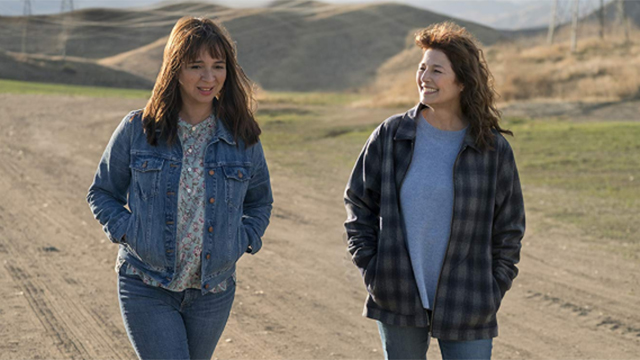
I know this show has been out for several months now, but I still don’t want to spoil anyone who hasn’t seen it. I’ll just say that if Maya Rudolph doesn’t win an Emmy for playing a middle-aged woman whose simmering desires and rage are awakened by another middle-aged women who’s even angrier than she is, I will be shocked. This is one of those rare shows that when I was watching it, I was like, “Wait, have I never seen this queer story before? I haven’t! I really haven’t!” (Also, if you still haven’t read Caity Weaver’s profile of Maya Rudolph, you really have to rectify that.)
Ruby and Sapphire, Steven Universe
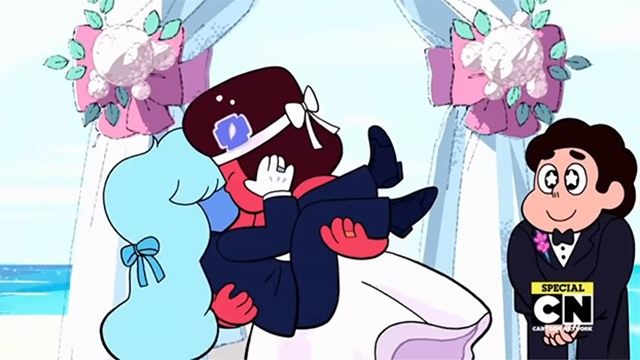
That they got married on Cartoon Network and smooched right on their non-binary femme Gem lips would be enough, but it’s not just the revolutionary representation that made them so great (again) this year; it’s that they’re brilliantly written characters who grow together and apart. They’re badass and they’re adorable and when Garnet marched into the most epic battle of her life, in her wedding dress, her battlecry was the best description of a relationship I have ever heard: “I am the will of two gems to care for each other, to protect each other from any threat, no matter how vast or how cruel!” Y’all couldn’t stop her 5,750 years ago and you cannot stop her now.
LEAST FAVORITE
Riese, Editor-in-Chief
Lila Stanton,The Purge

I started watching The Purge to see AZMarie do pull-ups in a sports bra, and found myself surprisingly drawn into the show as a whole, primarily into a love triangle between Lila, Jenna and Rick. Mostly because I was certain Rick was an asshole and Jenna was going to leave him for her true love, Lila, with whom she exchanged sweet kisses by the pool at a white supremacist murder party. Lila was not like her terrible parents! She was a lesbian who loved equality for all mankind! Then, over the course of two episodes, she slipped directly into the gaping maws of the psycho lesbian trope, which led to her eventual death.
Valerie Anne, Staff Writer
Jenna Betancourt, The Purge
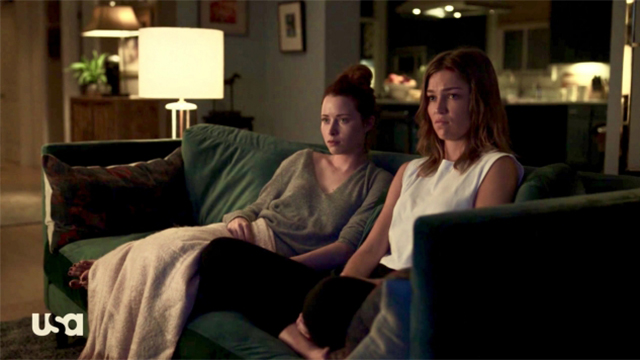
Like Riese, I also had high hopes for Jenna and Lila at the beginning of this show, with the sexy flashbacks and the sexier poolside kiss. I thought for sure she was going to ditch her scheming, potato-of-a-man husband before things got too insane. Alas, she chose wrong. I also quit this show before having to watch Lila be tripped up by tropes because it’s 2018 and self-care is important.
Just, everybody, Shameless
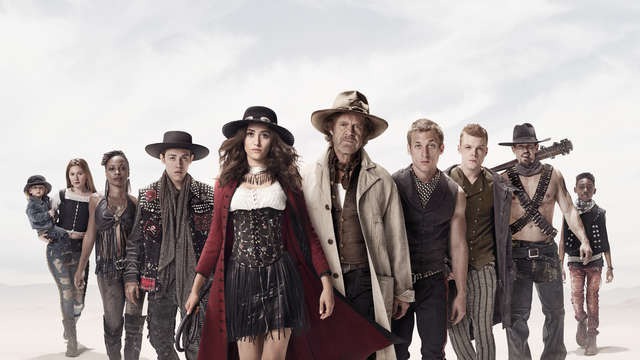
I get that V didn’t have a lot of experience with bisexual people before she started being in a throuple with Kev and Svetlana, but I feel like she was very willing to go back to IDing as straight after Svetlana left (well, after she ACTIVELY made life miserable for Svetlana) and try to chalk it up to being kinky. Also, I’m mad that after eight full seasons of wishing for Fiona to realize she was bisexual, and really thinking they were going to go there with Nessa, they made DEBBIE be the Gallagher sister in a relationship with a woman?? DEBBIE??? I love this show, but hoo boi they made me mad this year. Don’t even get me STARTED on the Gay Jesus cult. JUST DON’T. I’m going to finish out the season but if they really think they can go on without Emmy Rossum they have another thing coming.
Peach Sallinger, Hashtag You on Lifetime
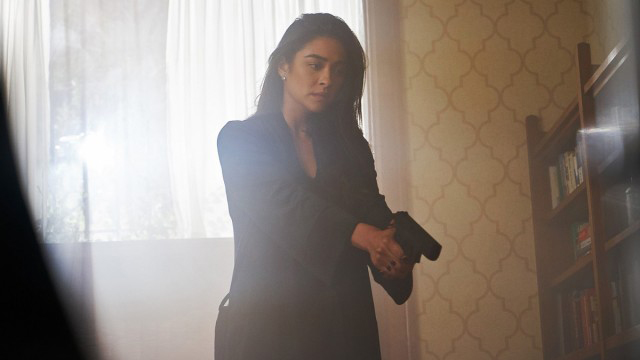
Peach is on my “worst” list not because I didn’t like her, but because i didn’t like her storyline. She started off so great. Shay Mitchell delivered her strongest acting performance to date, and Peach was the only voice of reason for miles around. However, if people who read the book hadn’t already told me she was a lesbian, I wouldn’t have known until it was revealed that she was maybe a psychopath and had dozens of photos of Beck sleeping and/or half-naked that didn’t appear to be taken with consent. :deep sigh: I stopped watching after she was smashed on the head with a rock but before she was murdered, and frankly I think the new exorcism movie Shay is in will treat her better than this show did.
Natalie, Staff Writer
Nova Bordelon, Queen Sugar
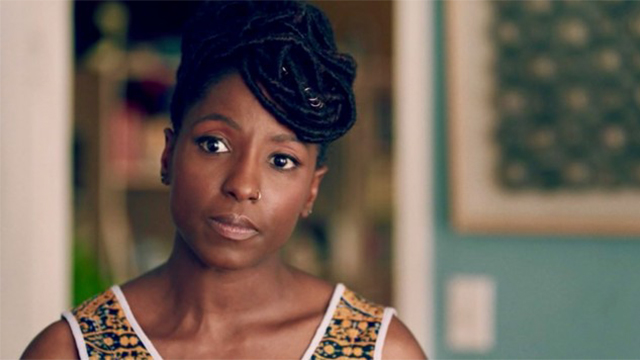
This one hurts, y’all.
I wanted Nova Bordelon to be great. I wanted this character, an original creation of Ava DuVernay’s designed to add to the rich tapestry penned by Natalie Baszile, to be great. I wanted this character, imbued with the spirit and identity of the founders of the Black Lives Matter movement, to be great. And, most of all, I wanted this character, played by Rutina Wesley, who I’ve adored (read: thirsted over) since long before she came out as queer last year, to be great. I wanted Nova Bordelon to be great – for Rutina, for me, for the culture.
But, oh no…
Because, even though it’s 20GAYteen, and even though GLAAD gave Ava DuVernay an “Excellence in Media” award, Nova Bordelon was not great this season. Over the last two years, Queen Sugar has erased Nova’s bisexuality from her identity and it’s been so disheartening to watch. Hearing Nova cry out for freedom, echoing the very words she said to her girlfriend in Season One, to her sister’s ex-boyfriend, Remy, of all people has been like pouring salt in an open wound.
Carmen and I talked about a lot of this back in August when the latest season of Queen Sugar wrapped, so I won’t belabor the point too much, but I will say this: one of the things that made this television show great, from the outset, was its full-hearted embrace of revolutionary politics. Carmen, quite rightly, called the first season a “black feminist masterclass.” It stood firmly on the side of justice and representation and was unapologetic about it. What worries me about Queen Sugar’s bisexual erasure is that it might be symptomatic of a shift, away from the revolutionary, and more towards the respectable.
And if that’s the case — if this once revolutionary show is going to embrace respectability politics — then it has become a shell of its former self and may not be worth investing in at all anymore.
Bárbara and Mercedes, Perdona nuestros pecados
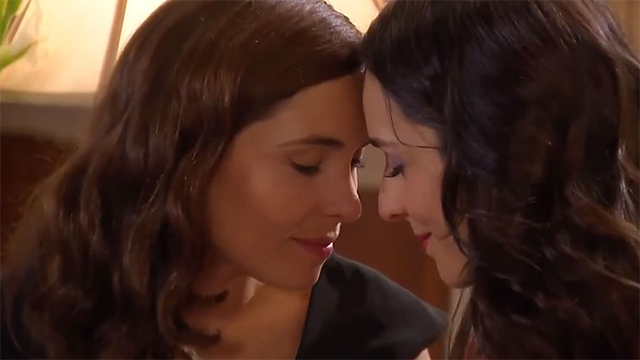
Earlier this year, when I was putting together our March Madness competition, I decided to create an International region, as a small way to acknowledge Autostraddle’s international readership. I scoured the Internet in search of 16 kisses worthy of inclusion in our contest and, in doing so, I stumbled upon Perdona nuestros pecados (Forgive Our Sins), a Chilean telenovela set in the fictional town of Villa Ruiseñor during the 1950s. The lesbian storyline on the show features Mercedes Möller, the sheltered daughter of the town’s mayor, and Bárbara Roman, the cosmopolitan but stifled wife of the town’s new police commissioner. They grabbed my attention in a way that few shows I discovered would — I’m pretty sure it was the couple’s second kiss in the church that hooked me — and I grew to love this pairing.
I’d watch the show live and glean what I could from the context and what little Spanish I know. I’d follow the hashtags on social media, discuss the show with other fans and eagerly wait for clips of the show and their translations. And, if the show had ended with its first season (which, by the way, included one of the best lesbian love scenes I’ve ever seen on TV), I would have no doubt included Bárbara and Mercedes among my picks for the Best of 2018. But apparently, even though it’s 20GAYTeen, I still cannot have nice things.
In an unprecedented move, the network decided to extend the telenovela for a second season and, for a while, it was good. With the romance between the women cemented, the story became more about the drama which was to be expected. Then the wheels came off and the writers subjected this couple to one awful trope after another and dug themselves into a hole so deep that they couldn’t really get out of it — and, in the process, diminished this once great couple.
Because we’re talking about our least favorite characters and we include pictures with our posts, it’s easy to attach our scorn to the actors but, honestly, it’s hardly ever about them (María Bello and Soledad Cruz were amazing). As with so many queer stories on television, Bárbara and Mercedes faltered because the writers got lazy. Too often, writers pen beautiful storylines about women falling in love because, even if they’re not queer women, that’s the part that they understand.After that, when it’s time to write about what a relationship between two women actually looks like, they can’t even fathom it. So, instead, they reach for tropes, either not realizing they were tropes or wrongly believing that they could succeed where so many others failed (spoiler alert: you can’t).
We need writers to do better. Be creative or, better yet, hire queer women to tell their stories. I only hope the writers behind Bárbara and Mercedes learn that lesson before the possible spin-off.
Carmen, Associate Editor
Lila Stanton, The Purge
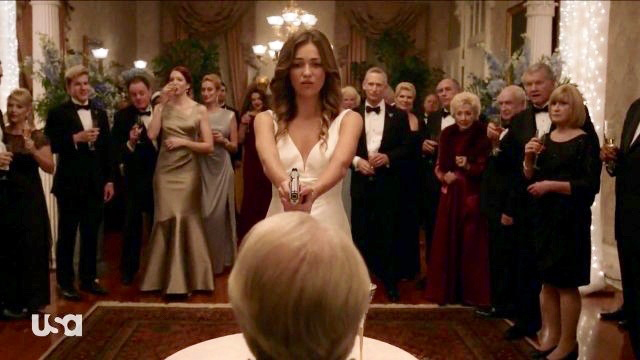
That sure was a rollercoaster! Like Riese, I came to The Purge with very low expectations, just wanting to see AzMarie sweat a bit in a sports bra (by the way, not nearly enough of that! Thanks for nothing, show). And much like Valerie, I was a goner from the first poolside kiss. I was 100% certain that The Purge was going to end with Jenna and Lila was the quintessential horror movie “final girls,” raising the sword of justice and holding each other in their arms as daybreak rose on another day. They were going to be the Lesbian Avengers! The complete set up was there! Instead Jenna decided to raise her baby with a potato sack and Lila got a complete and total personality transplant! Why? I have no idea! I assume because without turning her into a psycho trope at the last minute, her death wouldn’t have made any sense! So the writers forgot all their character development, Lila turned into some caricature from The Hand that Rocks the Cradle, and then she died. Good times, folks. Good times.
Nova Bordelon, Queen Sugar

Natalie said all that needed be said upthread. The only thing I have to add are my tears.
Do you want the salted water from my very body Queen Sugar? Take it. You’ve already taken everything else.
Heather Hogan, Managing Editor
Peach Sallinger, You

This was the weirdest year because almost no one on our TV team could think of any characters we hated. Even when we started digging down into, like, “Okay, but who was just written poorly?” I don’t know if that’s because there was so much excellent queer TV, none of us watched what was subpar; or if most things really were just good this year. Either way, that’s an excellent problem to have and my answer to this question is Peach Sallinger. It’s not because she was a lesbian psycho; I don’t mind that trope anymore and, frankly, it was refreshing to see Shay Mitchell play just a hardcore bitch. But like Valerie said, she was so underwritten it was hard to tell if she really was going to be a lesbian at all and then she got walloped in the skull with a rock almost as soon as we found out. Honestly, even if she’d lived, it wouldn’t have been worth the investment because every goddamn minute of this show was voiced-over by Dan Fucking Humphrey.


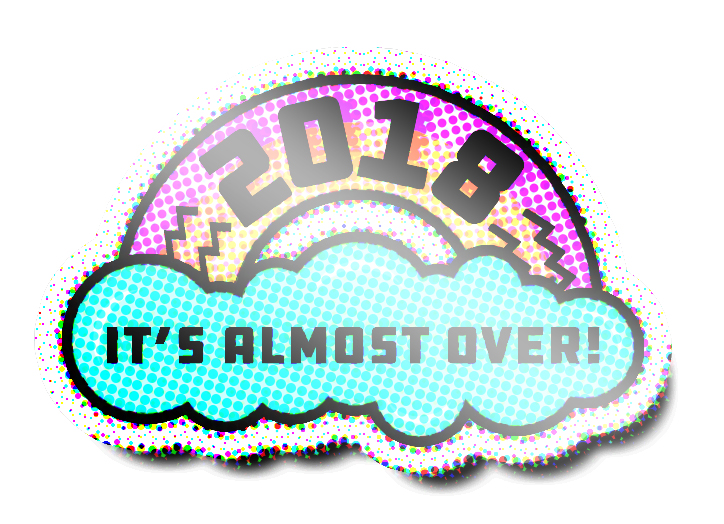

“I have a special place in my heart for all the Crain siblings (except Steven… fuck Steven)”
AMEN!
What I literally texted a friend upon finishing the show: “For real I have so much affection for every member of this family. Well except Steven. Steven can fuck off.”
suuuuper agree on everything said about Shamless!! But, for the life of me I can’t remember what woman Debbie got with? Help! I watched the most recent season a few months ago, and I’m totally blanking.
ooh and I too hated the way they were teeing up Nessa and Fiona and then just backed out of it ? I do not know what the show would be like w/ out Emmy Rossum andddd I don’t think I’ll keep watching
Oh wait MY BAD, I think I’m a season behind on Shameless! The last thing I saw was Ian getting arrested for the gay Jesus preaching ?
I’ll always mourn the Nessa/Fiona affair we never got.
it’s the most recent season! her name is alex and she is super hot and debbie is real terrible
Debbie is the worse. Sometimes I fast forward through her parts. I can’t imagine the show without Fiona. I doubt I’ll watch it.
I would like to honorable mention Alex Danvers, Nia Nal, Niska from Humans, and Kat Edison.
I could have written about so many more characters but these were definitely my faves. What a good year for queer TV!! Can’t wait to see what’s next!
I love Niska so much! I can’t wait until next series where I assume she will be de facto leader of the world.
Sally did I know that you love Niska? I also love Niska!
I feel like we have not discussed Niska, which is a glaring oversight!
Please can we wax lyrical about Niska and her amazing abilities to traverse great distances to save the day in season finales, which has really become her thing.
Can I just say how fascinating it is that while you were typing the phrase “wax lyrical,” I was using “wax rhapsodic” about my love for Niska and this show?
I am really conflicted when it comes to Alex at the moment. It has now been at least a whole year since we saw Alex so much as go on a date and/or kiss a woman. I still enjoy her as a character and especially her character growth in that time, but I am worried they will only show us Alex in her role as DEO Director and Kara’s sister and not her own person.
I’m here for some Niska love too!
I, too, am really sad and angry about what the Queen Sugar writers have done to Nova. :(
I was sitting in a business meeting when I got a text from my wife that just said “I need you to log in to Autostraddle and yell at them for not putting Kate Messner [Everything Sucks] on the best lesbian characters of 2018 list.” Having now read the article, I realize we cannot make her *your* favorite, but still, she’s great.
Kate Messner is definitely one of my favourites for this year!
Along with Waverly Earp, Nicole Haught, and Catra.
Having finished watching She-Ra yesterday, I am very glad to see Adora and Catra here, although I feel the entire cast deserves some kind of ensemble award.
I am so incredibly prepared/unprepared for the processing post that I recall Heather promised us.
For me, Niska on Humans has had the most intriguing story arc of all the conscious Synths and all the queer women on tv this year. When we were introduced to her in the first season, Niska seemed destined to be a two-dimensional, man-hating lesbian. And let’s face it, if you were created by some jackass to be his sex slave and then after you escaped that hellhole your brother hid you in a brothel “to keep you safe,” you’d have some issues with the male species too. We saw her soften a bit with young Sophie (whose acting chops are just ridiculous) and with her lover Astrid. Just writing that last sentence made me realize that Astrid is really a grown-up version of Sophie–all hopeful and willing to see the best in everyone–so it stands to reason that Niska would be drawn to them because they are everything that she is not. The writers could have kept her as a stunningly beautiful version of Hothead Paisan, running roughshod over the patriarchy with bloody ax in hand, but they chose a different path for our lady-loving-lady. Without spoiling her amazing journey, I’ll just say that Niska–bitter, curmudgeonly, and cold-as-ice–holds the key to the survival of not just Synthkind, but all of humanity. There aren’t nearly enough sweet lady kisses, mostly because of separation, but Astrid and Niska’s relationship endures and is arguably one of the most stable on the show. Like Harlots, this is not a series that you watch for the queer content, but for the relationships formed between women fighting for space in a man’s world. Laura, Mia, Niska, Sophie, Matty, Astrid, Neha, and, dare I say it, Karen and Agnes, are all women (and girls) worth getting to know. I could wax rhapsodic about these actresses’ acting skills, but I’m not sure I could do them justice or even to describe the brilliance of seeing Gemma Chan and Emily Berrington shift between human and Synth physicality. You’ll have to take my word for it, or better yet, watch all three seasons before the fourth launches next year.
Also, Riese, Nancy Birch..yes, please.
Niska deseves the world. I’d never made that connection between Sophie and Astrid before but it makes so much sense now. I still can’t believe that we got a synth in a same-sex relationship with a human and it’s a positive one with the human treating the synth like a human in all the ways that matter. It feels like a real change in TV.
My favorite is Petra Solano from Jane the Virgin. I relate so much, although I don’t look as dressed up in beach shorts as she does. I also used to be manipulative and in sort of dysfunctional relationships until I started to be more honest and open. And then I fell in love with a woman. And I got a bi bob. And I am still friends with my ex. I did not steal his sperm to get myself pregnant with twins, but the rest is just so relatable. Love this character.
“I did not steal his sperm to get myself pregnant with twins, but the rest is just so relatable.”
I love that that there is a reason for this sentence to exist and that you said it.
Can you swoon over a cartoon character? Damn right you can. When Catra showed up in that suit, I fell off my chair. I may have been sitting on a footstool with my feet on a coffee table, but I still fell. And then I fell again when Perfuma was dancing with Adora.
Worth it.
I haven’t got to that part yet but it’s good to know that I should come prepared with some cushioning on the floor below me, ty
I’m always a week or so behind the Black Lightning recaps (damn you Netflix) so I’m glad to have this space where I can say that in addition to all her other wonderful qualities listed above, Anissa Pierce’s blouse game is beyond compare and almost makes me want to re-re-evaluate my own presentation. Again.
Is it shallow that what cemented my like of Villanelle was her hairpin because I also have hairpins? Not all bisexuals have bobs, some of us have buns with purposely pointy things in them and never expect to be represented.
OK, you’ve just identified a kink I never knew I had. Bisexual* (hair) buns! Messy on the weekend. Sharp (with power suit) during the week. And it’s embarrassing to realise how many of my exes fall into that look.
(NB. Look also applies to professional lesbo femmes aka the Lawyer (money)/Librarian (less money) Look
You’re welcome.
Here for Anissa Pierce and Ruby and Sapphire!
Since everybody is talking about Niska, can I just say how much more awesome Emily Berrington is than I realized. Just earlier today I was rewatching 2×01, and I realized that Niska’s movements aren’t human. It’s something you won’t really catch unless you’re looking for it, but her face and head move in sort of smooth stage-by-stage motions. It’s very noticeable when she’s having breakfast with Astrid.
Arghhh, totally agree with Carmen about the whole Lila personality transplant on The Purge. WTF a complete waste of a passionate storyline build up. Totally uncalled for. It didn’t even make sense. It was like wanting a nice ice cold lemonade on a sunny, sweaty, muggy, humid 90 degree day and ending up with a dry hump in the sand :(
As a long time viewer it meant a lot to me that there was no doubt in the series finale of Adventure Time that Princess Bubblegum and Marceline are cannon. But also glad to see Theo Craine make the list more than once.
Signing in solely to add my vote for Niska, my favourite character on on my favourite TV show. I love Astrid too and love that Astrid is her opposite (and agree that Astrid is like a grown up Sophie). Looking forward to next season, despite the heartbreaks from the show this season. Also, I really enjoyed Freya and Keelin. Freya is kinda like Niska and Keelin kinda like Astrid. Freelin’s ending was a bit too rushed for me at the end, but the series was ending and it was a happy ending, so I give them a pass (even if it is the same network that killed Lexa).
My best friend persuaded me to watch Hill House – and I had heard a lot of people talking about it so in spite of not being a huge horror fan I gave it a go. And as soon as grown up Theo Craine appeared on stage I sat up and was very much invested – and that was before knowing she was queer! My best friend said ‘I thought that would cheer you up’ proving once again, that in spite of being straight, she recognises type before I do.Kind of using this post to share a cute story, but also YES I love Theo Craine so much and I am so happy with the way the story ended for her.